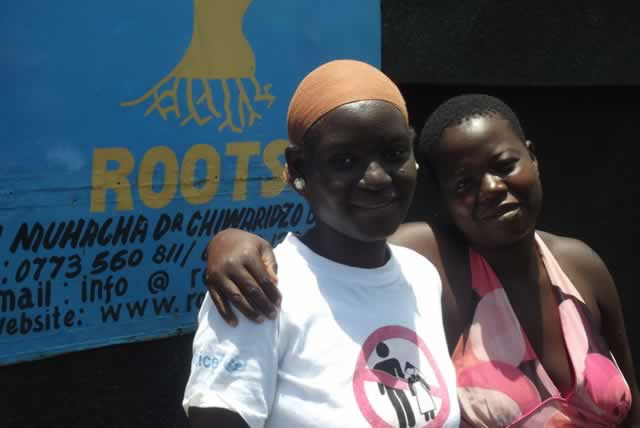Early marriages – Fight is on


Charlene Gebar and Tawananyasha Chabaikana believe their lives could have been different if their parents were still alive
Sydney Kawadza Senior Features Writer
The fight against early childhood marriages is on. But the obvious dangers associated with practices seem to have been lost among Zimbabwean teenagers. The horrendous ordeal suffered during pregnancy is not a deterrent for them.The nightmare of a 16-year-old pregnant girl from Chidodo who went into labour for more than a week on December 20, last year but lost the baby has not reached many in Zimbabwe.
Related……..
Chidodo is a village in Muzarabani District of Mashonaland Central at the border with Mozambique. The girl was married off at 15 and was taken to the nearby Kapare Clinic in Mozambique. Due to severe transport shortages in the area she was taken to hospital on a motorbike. Unfortunately, for two days she did not deliver, failing to push, presumably, because of her tender age.
She had to endure another motorbike ride to Chitsungo Mission Hospital in Mbire where she was immediately transferred to Harare.
To save her life she was operated on to remove the dead baby, lost due to the labour complications she suffered. She did not only lose her baby but suffered severe complications associated with teen pregnancies. Besides developing food drop she now suffers from obstetric fistula.
She has to return to Harare for regular check-ups after spending close to a month in hospital. An obstetric fistula is a hole between the vagina and rectum or bladder that is caused by prolonged obstructed labour, leaving a woman incontinent of urine or faeces or both.
An obstructed labour can last up to six or seven days. This is not an isolated case as some go unreported. Child marriages have also contributed to the rise in HIV and Aids cases among teenagers. A recent survey in Bindura and Shamva indicated a rise in the cases.
The dangers have not deterred girls rushing into or being forced into marriage. Charlene Gebar, now 20-years-old, is from Bindura married after failing to complete her education. Her mother died in 2002.
“I was moved around my relatives from Guruve, Bindura and Mhondoro until I ended up staying with friends. This happened for years, sometimes I slept at bus stops and eventually I fell pregnant. This would not have happened if my parents were still alive,” she said.
Tawananyasha Chabaikana (24) has had an abysmal life. Besides surviving rape at 13 she was married off at 14 following her mother’s death in 2008.
“I was staying in Matsvororo Village in Chiweshe and my mother’s husband raped me. When he was arrested I had to look after my four younger sisters.
“My uncles refused to assist us and we had to look for odd jobs, including working in other villagers’ fields,” she said.
She was married off as a second wife to a Harare-based businessman. “I refused but my relatives had accepted the lobola,” she said. She had a baby boy in August 2009.
“I spent about three months in hospital after giving birth. He is eight-years-old and stays with his father in Harare,” she said. “I returned home when I could not bear the abuse from the first wife and I wanted to look after my sisters who were also being abused by my uncle.”
She once tried to commit suicide by throwing herself into a borehole. Tawananyasha later moved to Bindura and married a Mozambican she met while looking for work.
“I stayed with him for years but he disappeared when I was admitted in hospital where I discovered I was HIV positive. I had four miscarriages by the time he disappeared. Every time I reflect on my misfortunes I always think of killing myself.”
Ignorance is also rampant in Shamva where girls believe marriage is a way out of poverty. A three-month pregnant girl, who at 16, is happy staying with her 18-year-old “husband” at Anarndale Farm she met in October last year.
“I stayed with my grandmother in Murehwa and I met him when I visited my sister last year. He sent me $7 to return here and I am hopeful he will pay lobola soon.” The Form 2 school drop-out believes her “husband” is her salvation.
“My husband is farmer and he grows tomatoes. I believe my life is better after I started staying with my husband,” she said. Plaxedes Kajimu (18) fell pregnant soon after completing her secondary education. “My baby is one year two months old and the father stays in Chegutu. I met him when we were in Form 4 and when I fell pregnant. My parents stopped me from staying with him but I hope one day we will be together,” she said.
To date Plaxedes does not know how she fared in her examinations.
Another 16-year-old child bride said she made the choice to stay with her boyfriend considering the problems at home.
“One weekend we met after watching nyau dancers and I decided to stay with him,” she said.
Her problems had been building up since she lost her father and mother in 2006 and 2008, respectively.
“I stopped going to school in Grade 7 and my brother who is married has four children could not look after all of us,” she said.
However, Mr MoreRand Nyongo blamed unemployment and lack of social activities for the bane.
“They have nothing to do hence end up engaging in sexual activities. Some would be trying to overcome poverty and hunger.”
Mrs Juliet Maponga blamed social and moral fabric breakdown, fomenting naughtiness in children.
“The parents are to blame and in some cases the children are generally very naughty. How do parents share bedrooms with their grown up children? Poverty has also been wreaking havoc in our communities but we are glad that Government has taken a stance against these immoral activities,” she said.
The 2014 Multiple Indicator Cluster Survey says early marriages are fuelled by poverty, orphanhood, religious and cultural values and family honour.
It blamed the legislated minimum age for sexual consent and marriage, which according to the Marriage Act, provides that marriage of a girl between the ages of 16 and 18 requires the consent of a guardian or a High Court Judge.
Ministerial consent is also required for the marriage of a girl under 16 years of age.
The Customary Marriages Act, according to the report, does not specify the minimum age of marriage. This was however, nullified in the Constitutional Court which ruled against valid marriages of children under 18.
The court struck down Section 22 (1) of the Marriages Act (Chapter 5:11) allowing children of 16 years to marry as unconstitutional.
It declared Section 78(1) of the Constitution setting 18 years as the minimum age of marriage and any law to the contrary also unconstitutional.
Section 22(1) of the Marriage Act, it also discovered, was born out of lack of commitment to the protection of the fundamental rights of the girl child.
Churches and other religious sects allowing child marriages were also barred from such practices.
The survey, however, noted that women married before attaining 18 tend to have more children.
It further reported that pregnancy related deaths are the leading cause of mortality for both married and unmarried girls.
The report said children married older man putting themselves at increased of HIV infection.
Real Open Opportunities for Transformation Support director Miss Beatrice Savadye called for a mindset shift to tackle child marriages.
ROOTS sponsors the fight against child marriages while promoting sexual health for girls in Mashonaland Central.
Miss Savadye said communities should interrogate and question their behaviour, attitudes and norms around child marriages.
“Many thought it was not an issue in Zimbabwe unlike in countries like Zambia and Malawi but we see that it is happening a lot here where statistics show that 31 percent of girls are married before the age of 18.”
She said the girls either fall pregnant, are forced into marriage or are raped while perpetrators evade jail by marrying them.
“We also have had cases of girls actually being married off because of poverty.”
She said society should understand the impact of these marriages.
“We have had cases of girls suffering from fistula while some are living with HIV because of these marriages,” she said.
ROOTS was part of the ConCourt case spearheaded by Veritas leading to the ruling against child marriages.
“Ultimately, what is needed is a multi-sectoral approach to ending child marriages including cases to do with poverty.”
She said high poverty levels were contributing to child marriages.
“There should be alternative livelihood choices and options for girls to be economically empowered,” she said.
Miss Savadye called for dialogue within communities to raise awareness of the ConCourt ruling.
Zimbabwe is ranked 41st in the world in as far as the prevalence of child marriages is concerned.
About 39 000 girls are married off every day worldwide while 14 million are in these marriages every year.
Feedback: [email protected]









Comments